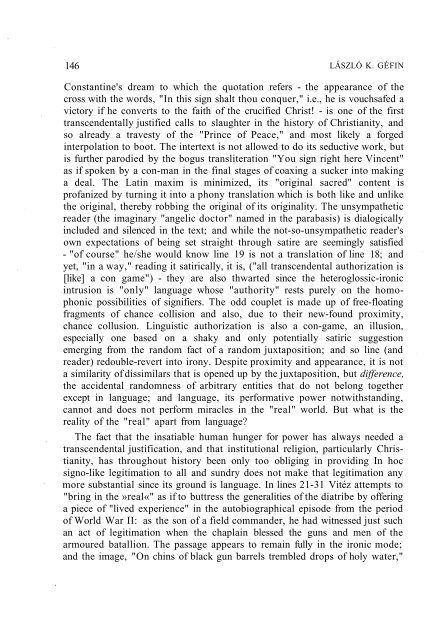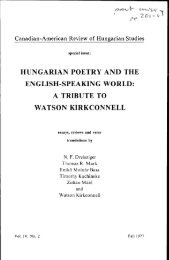146 LÁSZLÓ K. GÉFINConstantine's dream to which the quotation refers - the appearance of thecross with the words, "In this sign shalt thou conquer," i.e., he is vouchsafed avictory if he converts to the faith of the crucified Christ! - is one of the firsttranscendentally justified calls to slaughter in the history of Christianity, andso already a travesty of the "Prince of Peace," and most likely a forgedinterpolation to boot. The intertext is not allowed to do its seductive work, butis further parodied by the bogus transliteration "You sign right here Vincent"as if spoken by a con-man in the final stages of coaxing a sucker into makinga deal. The Latin maxim is minimized, its "original sacred" content isprofanized by turning it into a phony translation which is both like and unlikethe original, thereby robbing the original of its originality. The unsympatheticreader (the imaginary "angelic doctor" named in the parabasis) is dialogicallyincluded and silenced in the text; and while the not-so-unsympathetic reader'sown expectations of being set straight through satire are seemingly satisfied- "of course" he/she would know line 19 is not a translation of line 18; andyet, "in a way," reading it satirically, it is, ("all transcendental authorization is[like] a con game") - they are also thwarted since the heteroglossic-ironicintrusion is "only" language whose "authority" rests purely on the homophonicpossibilities of signifiers. The odd couplet is made up of free-floatingfragments of chance collision and also, due to their new-found proximity,chance collusion. Linguistic authorization is also a con-game, an illusion,especially one based on a shaky and only potentially satiric suggestionemerging from the random fact of a random juxtaposition; and so line (andreader) redouble-revert into irony. Despite proximity and appearance, it is nota similarity of dissimilars that is opened up by the juxtaposition, but difference,the accidental randomness of arbitrary entities that do not belong togetherexcept in language; and language, its performative power notwithstanding,cannot and does not perform miracles in the "real" world. But what is thereality of the "real" apart from language?The fact that the insatiable human hunger for power has always needed atranscendental justification, and that institutional religion, particularly Christianity,has throughout history been only too obliging in providing In hocsigno-like legitimation to all and sundry does not make that legitimation anymore substantial since its ground is language. In lines 21-31 Vitéz attempts to"bring in the »real«" as if to buttress the generalities of the diatribe by offeringa piece of "lived experience" in the autobiographical episode from the periodof World War II: as the son of a field commander, he had witnessed just suchan act of legitimation when the chaplain blessed the guns and men of thearmoured batallion. The passage appears to remain fully in the ironic mode;and the image, "On chins of black gun barrels trembled drops of holy water,"
THE AGON OF IRONY AND SATIRE 147while neutral, is exact and powerful enough to qualify as the ironic vortex ofthe "Christian Hungarian military theology."But the narrative is more (and less) than an instance of pure empiricalvalidation, a one-to-one copy of experience in the "real" world. Step by step,Christianity's self-legitimating metalanguage governs and orders the entireprocess, set off by the Constantinian device. The instruments of slaughter areblessed by a representative of Christ on earth, the chaplain himself being amere instrument, for "in fact" it is Christ who does the blessing. The act ofblessing is one of making something profane into something holy, to "sanctify"it. In the case of weapons and warriors being so sanctified, they areabsolved a priori of transgression against God's commandments,becoming defacto "Christ's warriors," their war a holy war. Benediction is always accompaniedby the gesture of making the cross, so the soldiers also appear to bevouchsafed a sign leading them to victory. In hoc signe- vincetis. The irony thusconsists not so much in the true-to-life observation and memory of Vitéz atage ten, caught in an actual war, but in its textual image being an intertextualemblem, allegorically juxtaposed to its emblematic antecedent, which is noneother than the crusades. Again, not the "real" crusades of history, but as theyhave become aestheticized in the ideological self-affirmation of all subsequentnobility (and non-nobility like the good preacher Billy Graham), as a floatingsignifer, a metaphor in language, an emblem of transcendental legitimation.The banner of the Virgin Mary fluttering above the freshly blessed weapons isalso a métonymie emblem of similar flags flown by Hungarian "crusaders"("kuruc" initially meant "crusader") against the Turkish "infidel" in the 16thand 17th centuries and the Austrian "infidel" subsequently. (Cf. the Kurucsong, "Két pogány közt, egy hazáért omlik ki vére" {the kuruc warrior{"vitéz"} sheds his blood for one country, caught between two infidels]. Thetraditional battle cry of Hungarian soldiers fighting the Turks was "Jesus".)"Our side" is semper fidelis to the Cross of Jesus, to God, to the Virgin, tofaith itself; the other side is always infidel. (Vitéz will gleefully relate in theCredo and the Sanctus how all rival camps, especially during the thirty Years'War, had claimed the Lord to be on their side, presenting the absurdity in aconcrete image: "Egyik táborból a másikba ugrál a Legfelsőbb Hadúr /tébolyult akrobata, - cigánykereket hány a fölbolydult Univerzumban" [41][The Heavenly Commander-in-Chief leaps from camp to camp / mad acrobat,- throwing cartwheels in the universal upheaval].) Hitler's war, in which theHungarian forces participated, had all the earmarks of a crusade, down to thebelt buckles of the Wehrmacht soldiers inscribed with '''Gott mit uns."In this reading, the ironic succession (not progress!) of emblematic tracesin the discourse of Christianity as shown by the Missa simultaneously shows
- Page 1 and 2:
Papers of the Radnóti Memorial Con
- Page 3:
HUNGARIAN STUDIESVOLUME 11, 1996 CO
- Page 8 and 9:
6 GEORGE GÖMÖRIprobably Fürst an
- Page 10 and 11:
8 GEORGE GÖMÖRIof the utmost impo
- Page 12 and 13:
10 GEORGE GÖMÖRIén e földön...
- Page 14 and 15:
12 GEORGE GÖMÖRINotes1. Miklós R
- Page 16 and 17:
14 MIHÁLY SZEGEDY-MASZÁKself alwa
- Page 18 and 19:
16 MIHÁLY SZEGEDY-MASZÁKtype is r
- Page 20 and 21:
18 MIHÁLY SZEGEDY-MASZÁKpose, the
- Page 22 and 23:
20 MIHÁLY SZEGEDY-MASZÁK"Wozu Dic
- Page 24 and 25:
22 MIHÁLY SZEGEDY-MASZÁKand Wilme
- Page 26 and 27:
24 MIHÁLY SZEGEDY-MASZÁKbeen the
- Page 28 and 29:
26 MIHÁLY SZEGEDY-MASZÁKBolond, k
- Page 30 and 31:
28 MIHÁLY SZEGEDY-MASZÁK6. Emery
- Page 32 and 33:
30 ZSUZSANNA OZSVÁTHand breaks as
- Page 34 and 35:
32 ZSUZSANNA OZSVÁTHThe drama echo
- Page 36:
34 ZSUZSANNA OZSVÁTHcontinents at
- Page 39 and 40:
FROM CAIN TO NAHUM 37which, as Csap
- Page 41 and 42:
\FROM CAIN TO NAHUM 39and bears and
- Page 43 and 44:
FROM CAIN TO NAHUM 41who sees what
- Page 45 and 46:
FROM CAIN TO NAHUM 438. "A félelme
- Page 47 and 48:
HELP ME, PASTORAL MUSE:THE VIRGELIA
- Page 49 and 50:
HELP ME, PASTORAL MUSE 47compete! W
- Page 51 and 52:
HELP ME, PASTORAL MUSE 49of a priva
- Page 53 and 54:
HELP ME, PASTORAL MUSE 51Once again
- Page 55 and 56:
HELP ME, PASTORAL MUSE 53Eighth Ecl
- Page 57 and 58:
HELP ME, PASTORAL MUSE 55have that
- Page 59:
HELP ME, PASTORAL MUSE 57Paul de Ma
- Page 62 and 63:
60 SAMUEL J. WILSONWe did, however,
- Page 64 and 65:
62 SAMUEL J. WILSONbeings and contr
- Page 66 and 67:
64 SAMUEL J. WILSONHungarians would
- Page 68 and 69:
66 SAMUEL J. WILSONthe Austrians. G
- Page 70 and 71:
68 SAMUEL J. WILSONnorth-eastern Zi
- Page 72 and 73:
70 SAMUEL J. WILSONoriginally pursu
- Page 74 and 75:
72 SAMUEL J. WILSONGörgey's decisi
- Page 76 and 77:
74 SAMUEL J. WILSONfrom occurring,
- Page 78 and 79:
76 SAMUEL J. WILSON8. Artúr Görge
- Page 80 and 81:
78 STEVEN TÖTÖSY de ZEPETNEKtört
- Page 82 and 83:
80 STEVEN TÖTÖSY de ZEPETNEKThe c
- Page 84 and 85:
82 STEVEN TÖTÖSY de ZEPETNEKher u
- Page 86 and 87:
84 STEVEN TÖTÖSY de ZEPETNEKthe b
- Page 88 and 89:
86 STEVEN TÖTÖSY de ZEPETNEKrooti
- Page 90 and 91:
88 STEVEN TÖTÖSY de ZEPETNEKcriti
- Page 92 and 93:
90 STEVEN TÖTÖSY de ZEPETNEK'My f
- Page 94 and 95:
92 STEVEN TÖTÖSY de ZEPETNEKshe d
- Page 96 and 97:
94 STEVEN TÖTÖSY de ZEPETNEKNotes
- Page 99 and 100: BERLIN ET PARIS DE LAJOS TIHANYIVAL
- Page 101 and 102: BERLIN ET PARIS DE LAJOS TIHANYI 99
- Page 103 and 104: BERLIN ET PARIS DE LAJOS TIHANYI 10
- Page 105 and 106: BERLIN ET PARIS DE LAJOS TIHANYI 10
- Page 107 and 108: BERLIN ET PARIS DE LAJOS TIHANYI 10
- Page 109 and 110: BERLIN ET PARIS DE LAJOS TIHANYI 10
- Page 111 and 112: BERLIN ET PARIS DE LAJOS TIHANYI 10
- Page 113 and 114: BERLIN ET PARIS DE LAJOS TIHANYI 11
- Page 115: BERLIN ET PARIS DE LAJOS TIHANYI 11
- Page 118 and 119: 116 KEVIN E. KELLYfilms Lugosi made
- Page 120 and 121: 118 KEVIN E. KELLYthe provinces, no
- Page 122 and 123: 120 KEVIN E. KELLYWith his brief an
- Page 124 and 125: 122 KEVIN E. KELLYboth his and Dean
- Page 126 and 127: 124 KEVIN E. KELLYfollowed it into
- Page 128 and 129: 126 KEVIN E. KELLYvampiric nobleman
- Page 130 and 131: 128 KEVIN E. KELLYThe film also boo
- Page 132 and 133: 130 KEVIN E. KELLYWood remained one
- Page 134 and 135: 132 KEVIN E. KELLYLugosi, convinced
- Page 136 and 137: 134 KEVIN E. KELLY19. Lennig, 112-1
- Page 139 and 140: THE AGON OF IRONY AND SATIREIN GYÖ
- Page 141 and 142: THE AGON OF IRONY AND SATIRE 139poe
- Page 143 and 144: THE AGON OF IRONY AND SATIRE 141tra
- Page 145 and 146: THE AGON OF IRONY AND SATIRE 143fek
- Page 147: THE AGON OF IRONY AND SATIRE 145ner
- Page 151 and 152: THE AGON OF IRONY AND SATIRE 149mov
- Page 153 and 154: THE AGON OF IRONY AND SATIRE 151for
- Page 155 and 156: THE AGON OF IRONY AND SATIREA harma
- Page 157 and 158: MURDER IN THE MOUNTAINSTranslated b
- Page 159 and 160: MURDER IN THE MOUNTAINS 157"Afraid?
- Page 161 and 162: MURDER IN THE MOUNTAINS 159Abády,
- Page 163 and 164: MURDER IN THE MOUNTAINS 161"The mar
- Page 165 and 166: MURDER IN THE MOUNTAINS 163Bálint
- Page 167 and 168: MURDER IN THE MOUNTAINS 165"That is
- Page 169 and 170: MURDER IN THE MOUNTAINS 167at hand,
- Page 171 and 172: CONTRIBUTORSMiklós BÁNFFYLászló
















